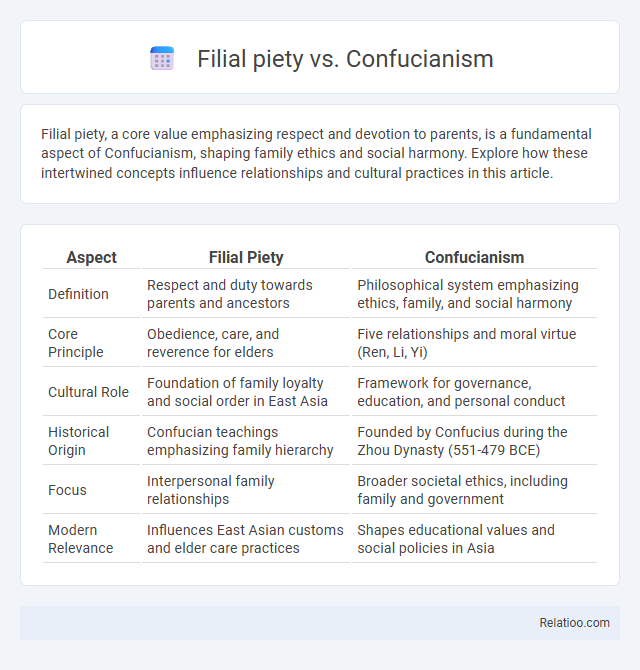Filial piety, a core value emphasizing respect and devotion to parents, is a fundamental aspect of Confucianism, shaping family ethics and social harmony. Explore how these intertwined concepts influence relationships and cultural practices in this article.
Table of Comparison
| Aspect | Filial Piety | Confucianism |
|---|---|---|
| Definition | Respect and duty towards parents and ancestors | Philosophical system emphasizing ethics, family, and social harmony |
| Core Principle | Obedience, care, and reverence for elders | Five relationships and moral virtue (Ren, Li, Yi) |
| Cultural Role | Foundation of family loyalty and social order in East Asia | Framework for governance, education, and personal conduct |
| Historical Origin | Confucian teachings emphasizing family hierarchy | Founded by Confucius during the Zhou Dynasty (551-479 BCE) |
| Focus | Interpersonal family relationships | Broader societal ethics, including family and government |
| Modern Relevance | Influences East Asian customs and elder care practices | Shapes educational values and social policies in Asia |
Defining Filial Piety: Origins and Meanings
Filial piety, a central virtue in Confucianism, originates from ancient Chinese culture emphasizing respect and devotion to one's parents and ancestors. Your understanding of filial piety involves not only family loyalty but also moral duties that reinforce social harmony and hierarchy. In Confucianism, filial piety extends beyond personal relationships to encompass broader ethical governance and societal stability.
Overview of Confucianism: Core Principles
Confucianism centers on core principles such as ren (benevolence), yi (righteousness), li (proper conduct), and xiao (filial piety), emphasizing harmony in social relationships and moral cultivation. Filial piety, or xiao, is a fundamental virtue within Confucianism, highlighting respect and devotion to one's parents and ancestors as essential to maintaining social order. Understanding Confucianism helps Your appreciation of how filial piety operates not only as a family duty but also as a key ethical foundation for society.
Historical Roots of Filial Piety in Chinese Society
Filial piety, deeply embedded in Chinese culture, traces its origins to ancient Confucian teachings that emphasize respect and duty towards one's parents and ancestors. Confucianism formalized filial piety (xiao) as a fundamental virtue shaping family hierarchy and social harmony throughout dynastic China. Your understanding of these historical roots highlights how filial piety transcends mere family loyalty, serving as a moral framework integral to Confucian philosophy and Chinese societal structure.
Filial Piety within Confucian Ethics
Filial piety is a core concept in Confucian ethics emphasizing respect, obedience, and care for one's parents and ancestors as a fundamental virtue. Confucianism integrates filial piety into its moral framework, viewing it as essential for social harmony and the cultivation of righteousness (ren) and proper conduct (li). The practice of filial piety in Confucianism extends beyond family to influence broader societal relationships and governance principles.
Differences Between Filial Piety and Confucianism
Filial piety, a central virtue in Confucianism, emphasizes respect and duty toward one's parents and ancestors, while Confucianism is a broader philosophical system encompassing ethics, governance, and social harmony. The primary difference lies in scope: filial piety specifically addresses family obligations, whereas Confucianism includes a wider array of moral principles and societal roles. Filial piety functions as a foundational element within Confucian teachings, guiding interpersonal relationships, but Confucianism extends this ethic to encompass rituals, education, and political theory.
Filial Piety’s Role in Confucian Families
Filial piety serves as a foundational virtue in Confucian families, emphasizing respect, obedience, and care for one's parents and ancestors, shaping family hierarchy and social harmony. Confucianism integrates filial piety as a key ethical principle, reinforcing family loyalty and societal stability through prescribed rituals and moral duties. Your understanding of filial piety within this framework highlights its role in maintaining intergenerational bonds and upholding Confucian moral teachings.
Evolution of Filial Piety in Modern Times
Filial piety, a core virtue in Confucianism emphasizing respect and duty toward one's parents and ancestors, has evolved significantly in modern times, adapting to contemporary social dynamics and individual rights. Unlike traditional Confucianism's rigid hierarchical framework, modern interpretations of filial piety prioritize mutual respect, emotional support, and practical care within diverse family structures influenced by globalization and urbanization. Your understanding of filial piety today reflects this balance between preserving cultural heritage and meeting the demands of modern lifestyles.
Confucianism Beyond Family: Social and Political Implications
Confucianism extends filial piety beyond the family, emphasizing loyalty and respect within broader social hierarchies and political structures. The concept shapes governance by promoting harmony, hierarchical order, and moral duty among rulers and subjects, reflecting Confucian ideals of societal stability. Filial piety thus evolves from a private virtue into a foundational principle guiding ethical behavior across all levels of society and government.
Contemporary Debates: Challenges to Filial Piety
Contemporary debates on filial piety highlight challenges such as balancing traditional obligations with modern individualism and economic pressures. Confucianism's emphasis on family hierarchy and respect often conflicts with evolving societal norms that prioritize personal freedom and gender equality. Your understanding of filial piety must consider these tensions as societies navigate between preserving cultural heritage and adapting to contemporary values.
Filial Piety vs. Confucianism: Relevance Today
Filial piety, a core virtue emphasizing respect and care for one's parents and ancestors, remains deeply embedded in East Asian cultures and continues to influence family dynamics and social ethics today. Confucianism, the broader philosophical framework from which filial piety originates, extends beyond family obligations to encompass principles of righteousness, social harmony, and moral development in society. In contemporary contexts, filial piety's relevance is seen in the ongoing cultural emphasis on elder care and familial duty, while Confucianism's values inform modern discussions on ethical leadership, education, and community responsibility.

Infographic: Filial piety vs Confucianism
 relatioo.com
relatioo.com